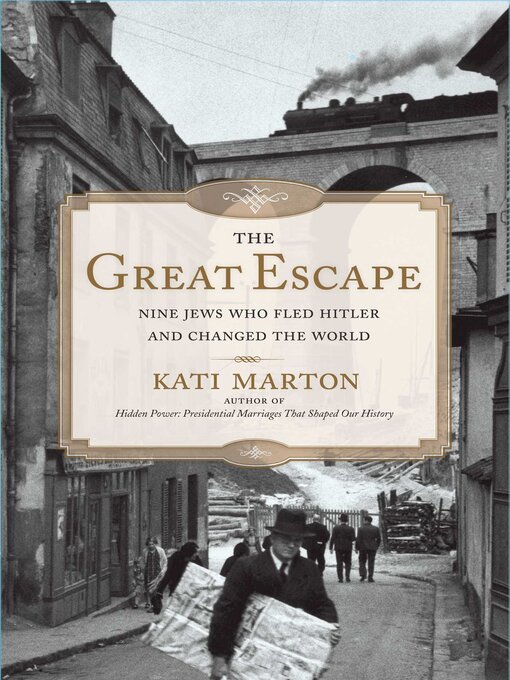This is the unknown chapter of World War II: the tale of nine men who grew up in Budapest's brief Golden Age, then, driven from Hungary by anti-Semitism, fled to the West, especially to the United States, and changed the world. These nine men, each celebrated for individual achievements, were part of a unique group who grew up in a time and place that will never come again. Four helped usher in the nuclear age and the computer, two were major movie myth-makers, two were immortal photographers, and one was a seminal writer.
The Great Escape is a groundbreaking, poignant American story and an important untold chapter of the tumultuous last century.
-
Creators
-
Publisher
-
Release date
October 17, 2006 -
Formats
-
Kindle Book
-
OverDrive Read
- ISBN: 9781416542452
-
EPUB ebook
- ISBN: 9781416542452
- File size: 8095 KB
-
-
Languages
- English
-
Reviews
-
Publisher's Weekly
Starred review from August 28, 2006
Noted journalist and bestselling author Marton (Hidden Power
) offers a haunting tale of the wartime Hungarian diaspora. The nine illustrious Hungarians she profiles were all "double outsiders," for, as well as being natives of a "small, linguistically impenetrable, landlocked country," they were all Jews. Fleeing fascism and anti-Semitism for the New World, each experienced insecurity, isolation and a sense of perpetual exile. Yet all achieved world fame. The scientists Leo Szilard, Edward Teller and Eugene Wigner, along with game theorist and computer pioneer, John von Neuman, spurred Albert Einstein to persuade Franklin Roosevelt to develop the atomic bomb. Robert Capa and Andre Kertesz became legendary photojournalists. Alexander Korda was the savior of the British film industry, and Michael Curtiz directed Casablanca
. Arthur Koestler penned the monumental anti-Communist novel Darkness at Noon
. Marton intricately charts each man's career in the context of WWII and Cold War history. Herself Hungarian-born, the daughter of journalists who escaped Soviet-occupied Hungary in 1957, Marton captures her fellow Hungarians' nostalgia for prewar Budapest, evoking its flamboyant cafes, its trams, boulevards and cosmopolitan Jewish community. Marton writes beautifully, balancing sharply defined character studies of each man with insights into their shared cultural traits and uprootedness. 16 pages of photos, map. -
Library Journal
November 1, 2006
Out of the many who fled Europe in the decade preceding World War II, a stunning variety of gifted men were from the small, distinctly isolated country of Hungary. Writer and reporter Marton ("Hidden Power: Presidential Marriages That Shaped Our History") has authored an engrossing book about nine important 20th-century men from that country: mathematician John von Neumann; scientists Edward Teller, Leo Szilard, and Eugene Wigner; pioneering photographers André Kertész and Robert Capa; filmmakers Alexander Korda and Michael Curtiz; and writer Arthur Koestler. Marton (also of Hungarian descent) pays homage to these men, intertwining their lives; covering the milestones that led each to greatness; and analyzing the circumstances that brought them there. She does such a good job of introducing her subjects, showing how they persevered through prejudice and personal problems to shape their times, that she leaves the reader wanting to learn more. Highly recommended for both public and academic audiences.Maria C. Bagshaw, Lake Erie Coll. Lib., Painesville, OHCopyright 2006 Library Journal, LLC Used with permission.
-
Booklist
November 15, 2006
Cast out of the cafes of cosmopolitan Budapest by the war, each of the nine extraordinary and ambitious men portrayed in this account would become a household name by the end of the twentieth century: Manhattan Project physicists Leo Szilard, Edward Teller, and Eugene Wigner; computer inventor John von Neuman; writer Arthur Koestler (" Darkness at Noon, "1940); filmmakers Alexander Korda (" The Third Man") and Michael Curtiz (" Casablanca"); New York photographer Andre Kertesz; and D-Day photographer Robert Capa. Each has a fascinating trajectory, worthy of its own volume. Woven together, however, the lives of these nine Hungarian Jews constitute a unique and inspired testament to creative genius born of adversity. As the title indicates, much of this adversity is brought on by the war, and much of this book is dedicated to its cast's efforts to escape Hitler and, in the case of the physicists, to bring about his defeat. But Marton's narrative is also a perceptive study of the abiding and perhaps particularly Hungarian loneliness that haunts and propels each man. Herself of Hungarian descent, Marton has affection for her subjects, enhancing her captivating prose.(Reprinted with permission of Booklist, copyright 2006, American Library Association.)
-
Loading
Why is availability limited?
×Availability can change throughout the month based on the library's budget. You can still place a hold on the title, and your hold will be automatically filled as soon as the title is available again.
The Kindle Book format for this title is not supported on:
×Read-along ebook
×The OverDrive Read format of this ebook has professional narration that plays while you read in your browser. Learn more here.



